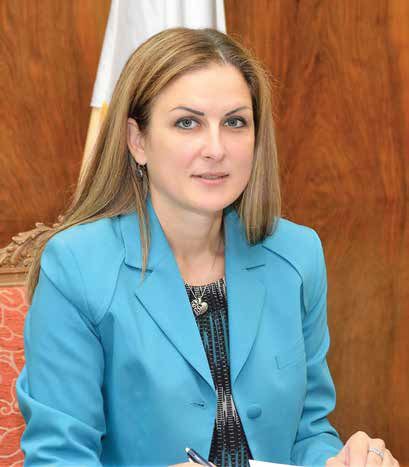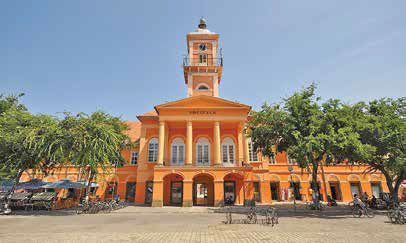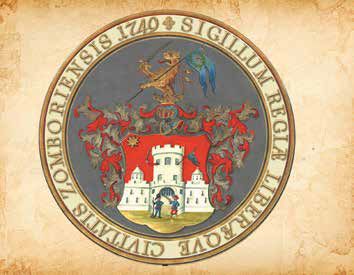„Every investor that comes to Sombor has a loyal partner in the town’s government because all of us are investing a lot of effort into attracting and promoting investments that will bring new technologies“, says Dušanka Golubović, Mayor of Sombor.

Why is Sombor appealing to foreign investors?
— From the very beginning, I came to the helm of the city, I am, for the most part, committed to improving the business environment, as well as strengthening the cooperation between the administration and investors. What distinguishes us from other local self-governments is that we have achieved a high degree of efficiency of the city administration and have become the first and the fastest town in issuing building permits in Serbia. Also, a very important achievement that we are particularly proud of is the fact that, last year, the Financial Times ranked us third on its of the cities of the future. We are trying to attract investors by low fees and affordable land. Before the end of 2018, we were audited for the BFC certification, which investors recognize as an attempt by the local self-government to create business conditions and standards they are familiar with and which are implemented in the EU member states. Potential investors, who intend to invest on the territory of our city, will find the geostrategic position of Sombor very important because the city is located in the far northwest of the country and borders with two countries that are EU members – the Republic of Croatia and the Republic of Hungary. It also has three border crossings – two with Hungary and one with Croatia. The biggest European river, the Danube enters Serbia near Sombor and with the port in Bezdan and Apatin, just twenty kilometres from the city, we have an excellent traffic and transport connection not only with our immediate neighbours but also with entire Europe. The developed road infrastructure will get you fast to Corridor 10 which is only 50km away and connects Sombor to important European centres. Sombor has a great and significant industrial heritage that attracts investors, and by industrial heritage, I mean the educated and qualified workforce. Today, investors recognize the town of Sombor as a place where it is possible to launch production in the food processing and automotive industry, because the town has sufficient human resources for these industries, production halls of former large companies, and 40 hectares of industrial zones, with a complete infrastructure and transport links, available to potential investors in the form of greenfield areas. Recently, thanks to the IPA cross-border funds, we started reconstructing the road connecting Sombor to Baja (in the Republic of Hungary). Sombor also has two key natural resources – the availability of fertile land and abundant waters. The town of Sombor encompasses 17 cadastral municipalities, spanning 110,000ha, with almost 30,000ha of agricultural land owned by the Republic of Serbia. The largest percentage of this land consists of arable land, classified as the second or third class. Sombor is known for its crop production, with fruit growing and cattle breeding expanding in recent years, which forms a solid raw-material basis for the development of processing capacities of quality food products.
How many companies are there in Sombor, which sectors do they operate in and what does their arrival mean for the town?
— In terms of the number of companies here, it is not sufficient only to quote their number and not talk about them any further. Today, on the town’s territory, there are over 1,200 small and medium- sized companies. We can say with certainty that, in the last 5 to 6 years, Sombor has been recognized by investors as a safe investment destination that, besides the fully equipped industrial zone, also offers greenfield locations and a number of brownfield locations that are especially interesting for investors who are coming to the Serbian and regional markets for the first time. As a result of everything that we have managed to accomplish in the last two to three years, and our ambitious plans for the upcoming period that are incorporated into our strategic and planning documents, we have partners in globally renowned brands and companies that have recognized our efforts and invested in Sombor and which today make the backbone of our agricultural development. These are the companies like Agriser,+ which planted hazelnut fields for the world-renowned Ferrero Company, or Apple World which exports its entire apple production, grown on over 300 hectares of land, to the Russian Federation. There are companies that are the result of foreign direct investments in the metal industry, textile and footwear production, but also there is a noticeable increase in the number of local firms engaged in the production and processing of cereals, milk, cheese and pastry products. The local self-government views, treats and values all these companies equally, and we are ready to provide each of them with full administrative assistance in building production capacities, raising the quality of human resources and connecting with other companies, as well as with the Chamber of Commerce, and state institutions.

What are your plans for 2019 when it comes to improving the business climate and services which the local self government provides with the view of boosting economic development?
— In early 2019, we completed the infrastructure in the industrial zone and put 40 hectares of land, ready for greenfield investments, which are only 3km from the town, at the disposal of potential investors. There is a possibility that this zone will be expanded in the upcoming period. It is important to note that the zone has also become a free customs zone, which is an answer to one of the frequent questions that investors interested in investing Sombor had. Naturally, as before, the town of Sombor and its government offers potential investors a series of investment incentives, like tax incentives. For instance, a company which employs unemployed persons has the right to a refund of a portion of the tax paid depending on the number of newly employed persons. Also, depending on the income that is being generated, the investor can be exempt from paying certain local utility fees. We should also not forget to mention the incentives granted by the higher state authorities, with investors mostly interested in exercising their right to grants when creating new jobs or building production facilities. Finally, in cooperation with the National Employment Office, the town of Sombor provides self-employment support in the form of professional assistance to the unemployed and in the form of subsidies for self-employment. In addition, the Professional Practice Programme has been implemented for several years now, where the unemployed person are trained to work independently with an existing employer, after which they can either start their own business or continue to work for their existing employer.

PARTNERS
Our key message for any prospective investor, who has been thinking about choosing a place to invest is that if they pick Sombor, they will find a partner in us, because we, in the local self-government, invest a lot of effort into attracting and promoting investments that will bring new technologies. I am primarily referring to processing plants, but also to the implementation of IT elements in agricultural production. Furthermore, we are constantly improving the infrastructure which provides investors with better connections, cheaper transportation of goods and services and more economical business. I would also like to underline that the city seeks to link different sectors and thus create a kind of service package for investors. Simply put, this means that it is sufficient for an investor to contact the local self-government, and it is up to us to present the town in the most efficient way, to network all the necessary stakeholders – from the education system that will provide trained workers, through the health and social care that will take care of the workers’ and investors’ rights, to administrative services, where civil servants have to perform the required tasks in order for the investment to be implemented in the fastest and most transparent way possible.